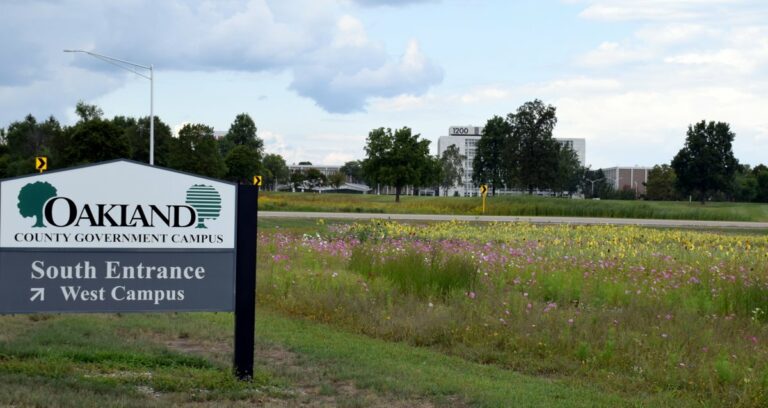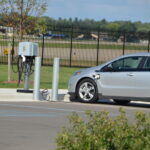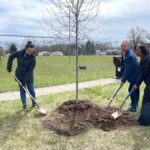
- Kim Kisner
- Community
- 05/16/2023
The County’s First Chief Environmental Sustainability Officer Shares Programs and Plans

Erin Quetell became Oakland County’s first chief environmental sustainability officer in 2021 after working for four years as the City of Ferndale’s environmental sustainability planner.
Quetell received a bachelor’s degree in Biology from Grand Valley State University and a master’s degree in Public Administration in Environmental Science and Policy from Columbia University in New York.
Before her time in Ferndale and Oakland County, Quetell worked in the private and nonprofit sectors with a focus on environmental issues through service in the Huron Pines AmeriCorps program, at the Greening of Detroit, and through consulting at OHM Advisors. She is a graduate of the 2020 Michigan Women’s Municipal Leadership program and Leadership Oakland Class XXIX. She served as previous co-chair for the Great Lakes Climate Adaptation Network, and is a current board member for the nonprofits Make Food Not Waste and the Clinton River Watershed Council.
SBN Detroit spoke with Quetell about her work, sustainability priorities, and how businesses in the county can be involved.

Q: In 2021, you stepped into the role of Oakland County’s first sustainability officer. Now, two years later, what impact do you think you’ve been able to make?
A: Well, it’s not just me. I do have a small team, and what I’m most proud of is we conducted a competitive bidding process and negotiated a renewable energy purchase so that we now have a third-party purchase agreement. Seventy percent of all electrical needs for Oakland County facilities will be from solar, which helps us toward our climate goals and helps demonstrate the priority of our decarbonization goals.
Additionally, we have finalized an environmental sustainability plan for the county campus and facilities which includes a review of all the county’s buildings to best determine energy and water efficiency improvements, accessibility, carbon reduction, and other sustainability-related upgrades.
Also notable, I think, is the work we are doing on the tri-county electric vehicle planning project. Residents and businesses are definitely interested in electrification, and we want to be able to offer people in our 62 cities, villages, and townships the resources they need to learn more. To that end, we developed an EV toolkit that’s a great resource for anyone interested in EV deployment.
Q: What are your top priorities for the county when it comes to sustainability?
A: We’ve been working to have a very clear understanding of what we need to do as an entire county in response to the climate crisis. Being fairly new in this role, I’ve been spending time meeting with groups and organizations to understand all local activity and in turn working to align with the MI Healthy Climate Plan with these greater efforts to maximize impact.
As I mentioned, electrification is a priority along with the alternative fuel corridors throughout Oakland County. With funding in the pipeline, we are identifying ways and partners to expand these alternative fuel corridors to include right of ways such as Grand River and Woodward and also facilitate greater community engagement around future vehicle electrification in general.

Another priority is continuing the county’s energy efficiency programming – such as weatherization programs – and leveraging opportunities to reduce the energy burden for residents and businesses. We have underrepresented communities in Oakland County that have been left out, and we need to provide help and resources to everyone going forward.
Q: I read that Oakland County became part of a class of 16 communities across the country that will be working to get the county LEED-certified by late 2023. What impact will this have on the county, stakeholders, residents, and businesses?
A: You can’t manage what you don’t measure and LEED certification for counties is a really good basis for sustainability metrics. LEED for cities sets a framework to collect data. The outcome of these metrics can then be utilized as a resource for businesses in the county in their acquisition and retention of talent – showing that it’s a good place to live and work.
Q: How do you work with businesses in the county to become more sustainable or equitable?
A: One piece of the puzzle is our procurement practices.
We are being very intentional in diversifying contractors and suppliers for county opportunities. Back to the LEED Certification, we can share out stronger metrics and qualifications when we bid out projects. Government contracts can be overwhelming for smaller companies, and this information will make things clearer so we can ultimately work with a broader range of companies in the county.
Outwardly facing, we have a large education push, specifically through our Oakland80 program, community navigators, and other workforce development programs. As electrification becomes more prevalent, people need additional and new training to support that transition. We are working to make sure our future workforce is nimble and has the skills in demand.

So far, much of my work has been networking and discussion. I have been in many conversations with various businesses related to mobility solutions such as electric vehicle charging infrastructure, batteries, and other sustainability practices. I work closely with our economic development team to start integrating more sustainability opportunities and show how the county is supportive and pushing for greater sustainability. There is still much to be done.
Q: What impact do you think Southeast Michigan businesses have on sustainability within the county and as it pertains to your role?
A: I think businesses have a lot more potential to move the needle than many people realize. One of the things we are talking about is how can we develop more sustainability networks and resources and how can we work collaboratively toward our climate goals. Businesses are becoming vested, and we are starting to see more collaboration, understanding, and pressure to address greater ESG efforts.
There is so much opportunity here – we have not scratched the surface, and I look forward to the potential outcomes.
Q: What advice would you give businesses in Oakland County if they are looking to work together toward sustainable practices?
A: I think starting with evaluating where you are today is the best way to approach it. Doing an internal audit to identify where you are in responding to sustainability requirements. And then start small. There is a lot of work to be done but a lot of companies are already on track in doing some of the things toward sustainability – like recycling etc. Build on that. And make sure you have the right resources and the capacity to do the work you outline. Hire more people – you will need a team!
Q: What are your biggest challenges?
A: Funding. But federal funding is becoming more available to municipalities. Also stakeholder engagement and capacity. I started as an office of one. I now have a full-time employee who reports to me and a part-time employee, but we will always need more help.
Q: What are the biggest opportunities?
A: This is the first time in a long time we have the political will, and this is making things move faster. It’s exciting. I’m optimistic for this year and next year – there is a lot of good work to be done, and we are ready for it.
And I want to make this call to action from the county to the businesses in the county … there are so many partnership opportunities. We just have to figure it out. There are innovative ways in which we can work together in response to the climate crisis. If you are interested I’m happy to partner to move sustainability forward in Oakland County.
Be sure to subscribe to our newsletter for regular updates on sustainable business practices in and around Detroit.
Kim Kisner
- All
- Business
- Community
- Education
- Events

Unique Monique Scented Candles, a Detroit-based business founded by Monique Bounds., aims to produce candles and household products with clean ingredients and local supply chains. What began as a personal hobby during college has evolved into a full-time venture producing coconut oil and soy-based candles made with essential oils and locally sourced materials. SBN Detroit interviewed Bounds about launching a sustainable product line, sourcing challenges in Michigan, and...

Eastern Market Partnership, in collaboration with the City of Detroit’s Office of Sustainability Urban Agriculture Division, has announced $240,000 in grant funding to support Detroit-based farmers and farmer collectives. The grants will advance food access, climate education, sustainable land use, and economic opportunity, with priority given to Black- and Indigenous-led farms, youth-led initiatives, and projects rooted in historically disinvested neighborhoods. The recipients – ranging from cooperatives and community...

Citizen Robotics is a Detroit-based nonprofit that advances the use of robotics and digital manufacturing in residential construction, focusing on improving productivity, sustainability, and long-term affordability. Best known for its early work in 3D-printed housing, it explores how alternative construction methods and new financial models can reduce material waste, lower lifetime operating costs, and enhance the resilience of homes. SBN Detroit interviewed Tom Woodman, founder and president of...







